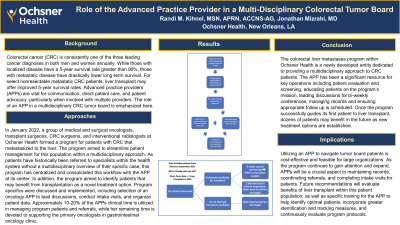Back


Clinical Posters
JL1028C: Role of the Advanced Practice Provider in a Multidisciplinary Colorectal Tumor Board
Saturday, October 22, 2022
10:00 AM – 11:00 AM ET

Has Audio

Randi M. Kihnel, MSN, APRN, ACCNS-AG®
Clinical Nurse Specialist
Ochsner Health, Louisiana, United States
Poster Presenter(s)
BACKGROUND
Colorectal cancer (CRC) is consistently one of the three leading cancer diagnoses in both men and women annually. While those with localized disease have a 5-year survival rate greater than 90%, those with metastatic disease have drastically lower long-term survival. For select nonresectable metastatic CRC patients, liver transplant may offer improved 5-year survival rates. Advanced practice providers (APPs) are vital for communication, direct patient care, and patient advocacy, particularly when involved with multiple providers. The role of an APP in a multidisciplinary CRC tumor board is emphasized here.
APPROACHES
In January 2022, a group of medical and surgical oncologists, transplant surgeons, CRC surgeons, and interventional radiologists at Ochsner Health formed a program for patients with CRC that metastasized to the liver. The program aimed to streamline patient management for this population within a multidisciplinary approach. As patients have historically been referred to specialists within the health system without a multidisciplinary overview of their specific case, this program has centralized and consolidated this workflow with the APP at its center. In addition, the program aimed to identify patients that may benefit from transplantation as a novel treatment option. Program specifics were discussed and implemented, including selection of an oncology APP to lead discussions, conduct intake visits, and organize patient data. Approximately 10-20% of the APPs clinical time is utilized in managing program patients and referrals, while remaining time is devoted to supporting the primary oncologists in gastrointestinal oncology clinic.
RESULTS
From March to July 2022, the tumor board evaluated 26 patients. The APP reviews medical records and conducts 90% of intake visits. She presents patients to the tumor board and documents the recommendations as discussed. Additionally, she coordinates patient care after meetings, including placement of needed orders or referrals. While networking in various locations, she advocates for and promotes the program with providers across additional departments and facilities. The program’s short-term goal is to proceed with at least 1 liver transplant in 2022. While none are scheduled for transplant, 5 are under careful monitoring for future transplant opportunities.
CONCLUSION
The colorectal liver metastases program within Ochsner Health is a newly developed entity dedicated to providing a multidisciplinary approach to CRC patients. The APP has been a significant resource for key operations including patient evaluation and screening, educating patients on the program’s mission, leading discussions for bi-weekly conferences, managing records and ensuring appropriate follow up is scheduled. Once the program successfully guides its first patient to liver transplant, dozens of patients may benefit in the future as new treatment options are established.
IMPLICATIONS
Utilizing an APP to navigate tumor board patients is cost-effective and feasible for large organizations. As the program continues to gain attention and expand, APPs will be a crucial aspect to maintaining records, coordinating referrals, and completing intake visits for patients. Future recommendations will evaluate benefits of liver transplant within this patient population, as well as specific training for the APP to help identify optimal patients, incorporate greater identification and tracking measures, and continuously evaluate program protocols.
Colorectal cancer (CRC) is consistently one of the three leading cancer diagnoses in both men and women annually. While those with localized disease have a 5-year survival rate greater than 90%, those with metastatic disease have drastically lower long-term survival. For select nonresectable metastatic CRC patients, liver transplant may offer improved 5-year survival rates. Advanced practice providers (APPs) are vital for communication, direct patient care, and patient advocacy, particularly when involved with multiple providers. The role of an APP in a multidisciplinary CRC tumor board is emphasized here.
APPROACHES
In January 2022, a group of medical and surgical oncologists, transplant surgeons, CRC surgeons, and interventional radiologists at Ochsner Health formed a program for patients with CRC that metastasized to the liver. The program aimed to streamline patient management for this population within a multidisciplinary approach. As patients have historically been referred to specialists within the health system without a multidisciplinary overview of their specific case, this program has centralized and consolidated this workflow with the APP at its center. In addition, the program aimed to identify patients that may benefit from transplantation as a novel treatment option. Program specifics were discussed and implemented, including selection of an oncology APP to lead discussions, conduct intake visits, and organize patient data. Approximately 10-20% of the APPs clinical time is utilized in managing program patients and referrals, while remaining time is devoted to supporting the primary oncologists in gastrointestinal oncology clinic.
RESULTS
From March to July 2022, the tumor board evaluated 26 patients. The APP reviews medical records and conducts 90% of intake visits. She presents patients to the tumor board and documents the recommendations as discussed. Additionally, she coordinates patient care after meetings, including placement of needed orders or referrals. While networking in various locations, she advocates for and promotes the program with providers across additional departments and facilities. The program’s short-term goal is to proceed with at least 1 liver transplant in 2022. While none are scheduled for transplant, 5 are under careful monitoring for future transplant opportunities.
CONCLUSION
The colorectal liver metastases program within Ochsner Health is a newly developed entity dedicated to providing a multidisciplinary approach to CRC patients. The APP has been a significant resource for key operations including patient evaluation and screening, educating patients on the program’s mission, leading discussions for bi-weekly conferences, managing records and ensuring appropriate follow up is scheduled. Once the program successfully guides its first patient to liver transplant, dozens of patients may benefit in the future as new treatment options are established.
IMPLICATIONS
Utilizing an APP to navigate tumor board patients is cost-effective and feasible for large organizations. As the program continues to gain attention and expand, APPs will be a crucial aspect to maintaining records, coordinating referrals, and completing intake visits for patients. Future recommendations will evaluate benefits of liver transplant within this patient population, as well as specific training for the APP to help identify optimal patients, incorporate greater identification and tracking measures, and continuously evaluate program protocols.

